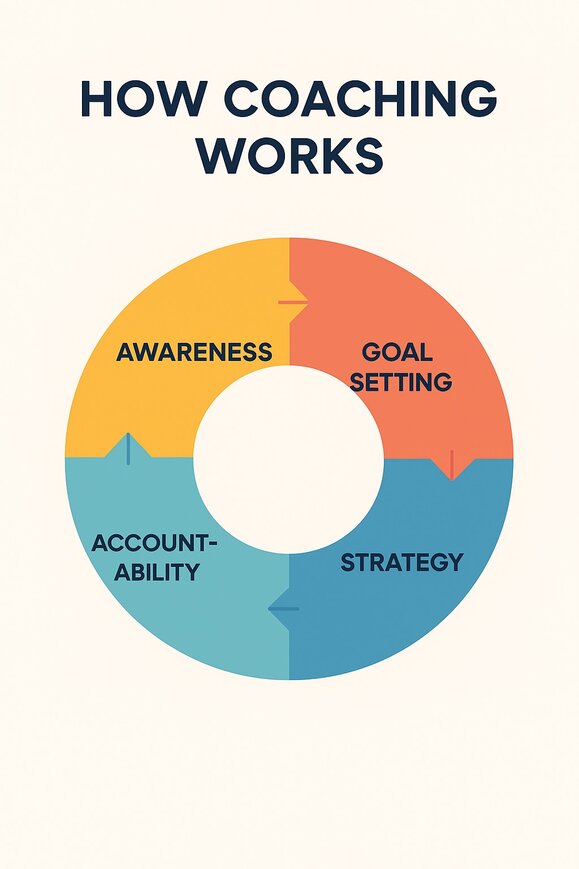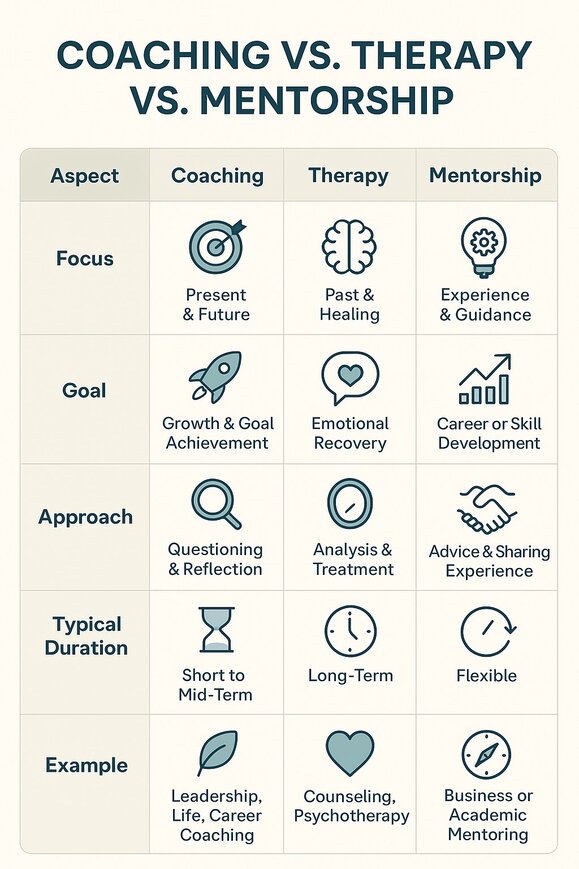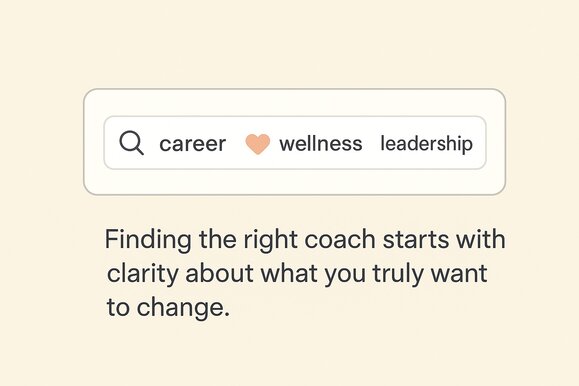What Is Coaching?
You’ve probably heard people talk about “getting a coach” — a life coach, a business coach, or a wellness coach — but what is coaching, really? It’s a structured, collaborative process that helps you move from where you are to where you want to be. Unlike therapy or mentoring, coaching means unlocking your potential through reflection, clear goals, and consistent action. A coach doesn’t fix you — they help you focus. Whether it’s leadership, relationships, or balance, coaching is about turning self-awareness into lasting growth. You can explore certified professionals and find a coach who fits your goals and personality to start your journey today.
Introduction to Coaching
At its core, coaching is a guided conversation with a purpose, a process that helps you see yourself more clearly and move toward your goals with intention. It’s not about someone telling you what to do, and it’s not about fixing what’s broken. Instead, it’s about drawing out what’s already within you — your strengths, your values, your potential — and giving them direction.
So, what is coaching in practice? It’s a structured partnership between a coach and a client (often called a coachee), where both commit to a shared goal: growth. The coach listens deeply, asks powerful questions, and helps you clarify what you truly want. From there, together you set achievable goals and design actions that align with your vision.
In simple terms, coaching is both an art and a science. The art lies in empathy, intuition, and human connection. The science lies in frameworks and evidence-based methods that support change such as the GROW model, mindfulness-based coaching, or emotional intelligence development. A skilled coach knows how to combine both, helping clients bridge the gap between thinking about change and living it.
Unlike other forms of personal or professional development, coaching means focusing on the present and the future rather than the past. It’s about momentum, accountability, and progress. You don’t need to have a problem to work with a coach, many people seek coaching when things are good but could be better. It’s like having a mirror that doesn’t just reflect who you are but who you can become.
Coaching can serve anyone — entrepreneurs seeking clarity, professionals navigating leadership roles, or individuals searching for balance in their daily lives. As the International Coaching Federation highlights, coaching increases self-awareness, boosts performance, and helps people make sustainable, meaningful change.
If you’ve ever wished for a trusted partner who helps you stay focused on your goals while keeping your values intact, that’s what coaching offers. It’s not about changing you into someone else but helping you become more you.

Think of it this way: imagine having a weekly conversation with someone whose only goal is to help you grow — no judgment, no agenda. Just insight, clarity, and support. That’s the essence of a coaching session.
Who Is Coaching For?
The truth is, coaching is for anyone who wants to grow. You don’t need to be a CEO, an athlete, or a public figure to benefit from it. You just need to have a desire, maybe quiet, maybe bold, to move from where you are to where you’d like to be.
People often discover that coaching means giving themselves permission to pause and reflect. It’s for those who are ready to stop running on autopilot and start living with more clarity and purpose. A college graduate mapping out the first steps of a career. A manager learning how to lead with empathy. A parent searching for better balance between ambition and home life. A founder navigating uncertainty. All of them can gain from coaching, because it adapts to the person, not the other way around.
In business, leaders turn to coaching for perspective: not just to sharpen strategy but to reconnect with what truly motivates them. In personal life, individuals use coaching to set healthier boundaries, build confidence, or rediscover joy in their routines. Across all these paths, one thing stays the same: the sense of accountability and partnership that helps people turn intentions into consistent action.
Research from BetterUp shows that individuals who work with a coach report higher life satisfaction and better performance outcomes. That’s because the process doesn’t hand you the answers — it helps you create your own, step by step.
Ultimately, what does it mean to be a coach or a coachee? It means entering a relationship based on trust and curiosity. It’s not a quick fix. It’s a practice that helps you align your actions with your values and your energy with your goals.
Coaching is for the dreamers who are ready to take practical steps. For the professionals who want to lead with more heart. For the people who quietly know there’s no more waiting, and are finally ready to reach for it.
Coaching vs. Therapy vs. Mentorship
The word coach is often used interchangeably with mentor or therapist, but while these roles may overlap in compassion and listening, they serve very different purposes. Understanding the distinction helps you choose the kind of support that truly fits your needs.
At a glance, meaning of coaching is about moving forward, helping you define what’s next. Therapy looks backward, healing what has been. Mentorship draws from experience, guiding you along a path someone else has already walked. All three are valuable, but they meet you at different stages of your journey.
Imagine this: therapy helps you heal the roots, coaching helps you grow the branches, and mentorship shows you how those branches can bear fruit. Each has its place, depending on where you are and what you need.
Coaching
Coaching means helping individuals clarify their goals, build actionable strategies, and strengthen the mindset needed to achieve them. It’s future-oriented and collaborative. A coach doesn’t give direct advice but instead helps clients find their own answers through reflection and accountability.
For example, if you feel stuck in your career, a coach won’t tell you what job to take, they’ll help you uncover why you feel stuck, define what success looks like to you, and build a clear plan to get there.
According to the International Coaching Federation, clients who receive coaching report higher confidence, improved communication, and greater life satisfaction.
Therapy
Therapy focuses on understanding emotional patterns, past experiences, and healing psychological wounds. A therapist helps address issues such as anxiety, depression, trauma, or unresolved grief. The relationship is diagnostic and often long-term.
If coaching asks, “Where do you want to go next?”, therapy asks, “Where have you been, and how has it shaped you?”
Both are powerful, but the intention is different. Therapy provides the healing foundation from which growth can begin.
Mentorship
Mentorship is experience-based guidance. A mentor is usually someone further along in a specific field who offers wisdom, advice, and feedback. Unlike coaching, the mentor’s expertise shapes the relationship, it’s about learning from someone’s lived experience rather than exploring your own internal answers.
For instance, a young entrepreneur might seek mentorship from a seasoned business owner who can share strategies that worked for them.
While a mentor gives you maps, a coach gives you a compass. One shows the path; the other helps you find your own.

Different Types of Coaching
One of the most fascinating things about coaching is how adaptable it is. It can meet you wherever you are in your career, relationships, or inner growth. Each type has a slightly different focus, but all share one purpose: to help you move forward with clarity and confidence.
Below are the most common types, divided into two main categories: Professional & Business Coaching and Personal Development Coaching.
Professional & Business Coaching
Executive Coaching
Executive coaching is designed for senior leaders and executives who want to sharpen their strategic thinking and emotional intelligence. It focuses on leadership effectiveness, communication, and decision-making.
Example: A CEO might work with a coach to navigate organizational change or build a more collaborative company culture.
According to Forbes, executives who engage in coaching often report improved team performance and stronger leadership impact.
Leadership Coaching
Leadership coaching helps professionals grow into authentic, self-aware leaders. It blends emotional intelligence with practical management skills, empowering people to inspire others rather than simply manage them.
This type of coaching means learning how to lead not just through authority, but through presence and trust.
Career Growth Coaching
For those at a crossroads — changing roles, considering a new industry, or striving for promotion — career coaching provides structure. It helps define direction, clarify personal values, and set realistic steps toward professional goals.
Example: Someone returning to work after a long break might work with a career coach to rebuild confidence and update their skillset.
Sales Coaching
Sales coaching focuses on performance improvement, mindset, and communication. It’s not about teaching sales scripts but about understanding human behavior, what drives trust and connection in conversations.
Organizational Coaching
Aimed at companies, organizational coaching improves culture and teamwork. It aligns individuals with shared goals and increases engagement across departments. It’s often used during growth or restructuring phases to maintain alignment and morale.
Personal Development Coaching
Life Coaching
The most familiar form, life coaching, helps clients set personal goals and follow through. It’s about creating harmony between who you are and how you live.
Example: Someone might hire a life coach to create a better work-life balance or find direction after a major life change.
Relationship Coaching
Relationship coaching focuses on communication, trust, and empathy whether for couples, families, or individuals. The goal isn’t just to “fix” relationships but to help people understand how they show up within them.
Wellness & Health Coaching
Wellness coaches guide clients toward healthier habits, from nutrition and fitness to stress management and sleep quality. This kind of coaching guide helps people create sustainable lifestyle shifts rather than quick fixes.
Financial Coaching
Financial coaching is not the same as investment advice. Instead, it’s about mindset helping individuals manage money consciously, plan realistically, and align spending with values.
Example: A financial coach might work with someone who earns enough but struggles with saving or emotional spending.
Mental Fitness Coaching
This newer area of coaching helps strengthen focus, resilience, and self-regulation. It blends mindfulness, neuroscience, and positive psychology to train the mind like a muscle. Ideal for anyone navigating stress or burnout, it supports long-term balance and emotional agility.
Coaching comes in many shapes, but they all share one heartbeat helping people become intentional about their lives. Whether it’s about business growth or inner calm, each path of coaching leads back to the same destination: a more conscious version of yourself.
Key Benefits of Coaching
The real magic of coaching isn’t in a single conversation, it’s in what happens afterward. It’s in the moment you make a decision that used to scare you. The confidence to say no when you mean no. The quiet awareness that you’re becoming someone more centered, more intentional, and more capable of shaping your life.
So, what are the concrete benefits? Here’s what most people experience after committing to the process, and what research consistently supports.
✔ Increased self-awareness and emotional intelligence
One of the first things people notice is a deeper understanding of themselves — how they think, react, and communicate. Self-awareness is the foundation for every meaningful change. According to Harvard Business Review, leaders who cultivate emotional intelligence through coaching improve team trust and decision-making effectiveness.
✔ Improved decision-making and leadership skills
Whether in business or personal life, coaching helps you make decisions that align with your long-term goals, not just short-term comfort. You start recognizing patterns and shifting from reactive choices to deliberate action.
✔ Higher resilience and stress management
When challenges arise, coaching is a practical tool for emotional balance. Through reflection and guided techniques, you learn to handle stress without losing focus — transforming pressure into progress.
✔ Better work-life balance and career satisfaction
Coaching encourages you to set boundaries, prioritize what matters, and define success on your own terms. That shift alone can transform how you experience both work and rest.
✔ Stronger motivation and goal achievement
Coaching doesn’t rely on willpower alone. It gives you accountability, someone who helps you stay true to what you said you’d do. According to ICF Global Coaching Study, 80% of clients improved their self-confidence and 73% improved relationships and communication skills through coaching partnerships.
In essence, what does coaching mean for you? It means having structured support to turn insight into action. It’s the difference between hoping for change and actually living it.
Some clients describe it as “having a clear mirror”, someone who sees your potential even when you forget it’s there. That’s not magic. Best coaches give the power of perspective, commitment, and connection.
The Cost of Coaching
One of the most common questions people ask before starting their journey is simple: How much does coaching cost? The truth is, coaching is not a one-size-fits-all service. Prices vary based on several factors such as the coach’s experience, the type of coaching, and how sessions are structured. Think of it less as a purchase and more as an investment in progress.
Key Factors Affecting Cost
Coach’s Expertise
A coach with advanced certifications or many years of experience usually charges higher fees. They’ve worked with diverse clients, refined their methods, and often specialize in specific areas such as leadership, business, or emotional resilience.
Type of Coaching
Not all coaching is priced the same. Executive or business coaching, for instance, often costs more than life or wellness coaching because it involves complex organizational dynamics and measurable business outcomes.
Session Format
One-on-one sessions are the most personalized and therefore the most expensive. Group or online sessions can be more budget-friendly alternatives while still offering valuable accountability.
Coaching Duration
Many coaches offer packages, for example, three-month or six-month programs that provide better value per session. This also allows enough time to see meaningful results, as true transformation takes consistency.
For a detailed breakdown, you can explore our article about the price of coaching, where we discuss average costs and how to choose a plan that fits your goals.
Estimated Price Ranges
Here’s a general overview of what you might expect when considering professional coaching:
- Basic Coaching: $50–$150 per session
- Ideal for beginners or group coaching settings. Sessions are typically shorter and focus on goal clarity or habit-building.
- Mid-Level Coaching: $150–$500 per session
- Led by experienced, certified coaches who offer personalized strategies, follow-ups, and accountability tools.
- Premium Coaching: $500–$2,000+ per session
- Designed for executives, entrepreneurs, or individuals seeking high-level transformation. Premium coaches often work with data-backed models and advanced assessment tools.
No matter where you start, coaching means committing to growth, not buying instant success. The value lies in the outcome: more confidence, clearer focus, and measurable progress toward goals that actually matter to you.
When viewed that way, the cost of coaching becomes not just reasonable but empowering, an intentional step toward becoming your most capable self.
How to Find the Right Coach
Finding the right person to guide you through your coaching journey is a deeply personal decision. The best coach isn’t necessarily the most famous one, it’s the one whose values, style, and approach resonate with yours.
The process of coaching means building trust. That’s why the connection you feel with your coach matters as much as their experience or credentials. You should feel comfortable enough to be open, and confident enough to be challenged.
Here’s how to make the search easier and more meaningful:
1. Identify Your Goals and Needs
Start by defining what you want to change or improve. Are you seeking career clarity, emotional balance, or stronger leadership? The more specific you are, the easier it is to match with someone who specializes in that area.
2. Research Credentials and Experience
Look for certified professionals with a proven track record. Reputable organizations like the International Coaching Federation (ICF) ensure that their members follow ethical standards and structured training.
3. Review Testimonials and Case Studies
Real stories from past clients can reveal a lot about a coach’s style and impact. Notice whether people mention clarity, confidence, or consistent results, those are signs of effective coaching practice.
4. Schedule an Initial Consultation
Most coaches offer a free or low-cost discovery call. This is your chance to see if there’s a natural connection and whether their approach feels aligned with your goals.
If you’d like to save time and explore verified professionals across different fields, platforms like DreamCoachMatch help you find a coach that fits your goals, schedule, and personality. You can browse profiles, compare areas of expertise, and select from some of the best coaches in business, wellness, leadership, or personal growth.

When you take the time to choose consciously, the coaching process becomes not just a program but a relationship built on trust, focus, and shared growth.
Start Your Coaching Experience
By now, it’s clear that coaching is more than just a conversation, it’s a guided process that helps you turn awareness into action, and intention into progress. Whether your goals are personal or professional, this journey begins with a simple step: saying yes to your own growth.
The beauty of coaching means that it’s entirely yours: your pace, your insights, your transformation. The right coach won’t tell you who to become; they’ll help you uncover the version of yourself that’s already waiting to emerge.
At DreamCoachMatch, you can easily connect with certified professionals from different fields — leadership, life, wellness, career, and beyond. It’s a place where you can find a coach who truly fits your goals and personality. All it takes is completing a short form, and your journey toward more focus, confidence, and balance can begin today.
When you finally take that step, you discover that what does it mean to be a coach or to be coached is not about changing who you are. It’s about realizing who you’ve been capable of being all along.
So, start now. Fill out your form, meet your coach, and let the next chapter of your story begin with purpose, clarity, and trust in your own growth.






